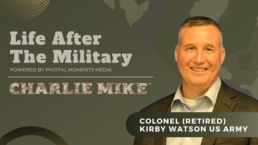Military Transition: From Combat Boots to Business Suits
Military officers spend a significant portion of their lives servicing our country to protect their fellow brethren. While transitioning to civilian jobs, military personnel have faced many difficulties, a severe issue for countries with big-armed forces like the United States.
After a time of service, such employees seek to develop a career, frequently without the credentials required for current or future employment openings. Military environments generally have their hierarchies and language, making it challenging for most veterans to transition into the civilian sector because of the stark differences.
In this podcast, Lee Elias and Howie Cohen interview Kriby Watson, a retired military officer for 30 years, shares his experience and the must-haves of being able to excel in your transition to civilian employment. His rich experiences have big takeaways for virtually anyone in the beginning stages of their career. Here are eight things to do to give yourself an edge in every interview.
Starting brand new.
Beginning a new journey is complex, and the anxiety often gets the best of us. Realizing that every transition benefits from your past experiences are critical; it’s always the same skills but applied differently.
Your previous career is over.
Having a goal-oriented mindset and an earnest desire to start in a new direction will help you but moving on from your previous career is equally essential to success. Having a sincere desire allows you to be open to new understandings that may differ from how things are in the military.
Mental, physical, and emotional well-being.
All three levels of your health are equally important. You will only be able to take care of others if you take care of yourself first. It is vital to take new beginnings as a challenge than a setback from your previous career.
Research.
When interviewing for new jobs, platforms like LinkedIn will come in handy as they will highlight common connections. The platform is also significant in building new relationships, which will help you understand the company culture you’re applying in.
Asking for help is okay.
Military veterans have a strong mindset that, believe it or not, can get in the way of success. Remember that success is all about the team; relying on your team and asking for help is okay. Together we are strong.
Ice breakers.
For your interviews, researching and looking up company leaders and the interviewer is vital to draw common factors to use as ice-breakers. Make a memorable impression.
Having an open-mind.
Military operations are very different from the civilian sector. Hence, applying the same principles might not work out perfectly, so having an open mind to new learning curves will play a significant role in your success.
Have compassion.
The emotional drive is essential for your team to thrive. This may sound like a cliche, but taking care of those around you and having compassion for your team will instill a positive value system. It will also help your team transition from a simple work environment to a family-oriented environment.
Watch to Learn More

Strengthen Mental Fitness with Financial Education
Libby Snyder from Merril Lynch shares her incredible story of how she ended up working as a financial advisor and how each phase of her life aided in her career as a financial advisor.
Here are 5 ways to improve your mental health and equip yourself with financial knowledge.
- Conscious effort in exploring/learning about financial systems. As Libby highlights, our schools don’t teach much about financial systems, and all of a sudden, a student is asked to take a student loan with no idea how this would impact their life. So, it is vital to develop a routine of reading and exploring financial knowledge or enrolling in a course that gives you a baseline knowledge of what compound interest is versus principal interest, etc.
- Developing a circle of influence. You become what you are surrounded by, so choosing what type of people you want to hang out with is critical. Typically, having a clear sense of your goals, whether financial stability, building new income streams, improving financial management, etc., can help you identify influencers and friends.
- Developing a routine. Having 30 minutes to an hour for yourself can be life-changing, whether you workout, read, meditate, do yoga, etc. All of these elements can help you be in the sense of appreciating all that is around you. When surrounded by positive thoughts, your neuro patterns will light up in ways you’ve never thought of. Suddenly, an idea would pop, and you’ll find new solutions to the same problems.
- Understanding the consequences of accessible capital. Taking a loan from the bank or purchasing something on your credit card is easy and accessible but understanding the long-term consequences is essential.
- Don’t overwhelm yourself; small steps can make up for a long journey. We often have the tendency to run towards a goal or our better version once we identify an issue. It is crucial to understand that giant leaps will do little because it’s not about how much you can cover in one go but instead how much you absorb and adapt. Hence, bite-sized information daily can help you understand big ideas in the long run.
Lastly, Libby shares that finding what’s most important to you is essential. In addition to this, reading and journaling can really help to get into a positive mindset; being involved with the community can be a great way to come across inspiring stories, which can, in turn, help us. Check out the full conversation with Libby Snyder on Mental Recess.
Mental Health Boundaries at Work
Atlas of the Heart by Brene Brown is one such book that maps the emotions and stages of the human experience. It gives us a peek into how we function and how our thoughts create the reality we live in. If living through the pandemic taught us one thing, then it’s that nothing is in our control except ourselves, our thoughts, emotions, and our recognition of it. Living through the pandemic, we had to adapt. Most of us find ourselves in a world where our personal and professional life now is integrated more than ever. Thus making it even more challenging to establish a clear boundary around it. As a result, we sacrifice our professional goals for personal life or vice versa. So, how do we set limits to ensure that we balance our professional and personal relationships? Most importantly, how do we do this to keep a healthy mind space for ourselves?
The professional space is tricky since there is a wage or a salary involved. We primarily do not allow ourselves the well-being of our mind space. Still, contrary to this, Brene suggests that allowing ourselves healthy boundaries can serve as a nurturing environment for us to achieve our goals and serve as an inspiration to those around us who are struggling.
Those who do not appreciate your boundaries often struggle themselves; their lack of appreciation is a clue of their own struggles and for you to help them in their journey. In this article, we will give you 5 tips on how you can establish healthy boundaries in a workplace environment.
Develop a morning routine.
We often feel guilt or shame when setting up boundaries, and most of the time, it comes from a space of self-neglect. To counter this, it is essential to focus on ourselves. A fun way to do this is to develop a morning routine. It can be exercise, skincare, planning your task list, or even making yourself a healthy breakfast. A morning routine subconsciously tunes you to focus on yourself and teaches you the importance of spending time with yourself.
Self-awareness is a good thing.
Pay attention to your instincts! What gives you a sense of security? What causes you to feel uneasy? Setting boundaries is prioritizing your comfort to feel secure and present with others, but you must first acknowledge and honor your feelings. Allowing boundaries to shift and alter as you grow is essential; let this happen while also making space to recognize and sit with your feelings.
Don’t explain personal time off.
We are often taught to be there whenever we are asked for in the corporate world. In the long run, most of us forget the importance of taking time off just because we think our employers wouldn’t understand. We have all lied at work just to secure personal time off so that we don’t upset our employers or loved ones. However, it’s essential to be truthful to ourselves, and when we lie to others, we are essentially lying to ourselves. For example: if you want to spend time at home, there is no need to come up with excuses, no need to explain why and the how; just honoring the desire of spending time with loved ones is enough. You’d be surprised how much you’ll inspire others to do the same.
Start small if creating boundaries makes you feel uncomfortable or frightened.
You have the right to say no without feeling bad, but it takes practice! Begin by establishing a little barrier in a more manageable location, then gradually increase it. If it makes you feel more comfortable, you can offer an option while creating a boundary. If someone asks you for a favor and you don’t feel comfortable doing it, you can suggest a tool or another person who can help.
If you need backup, get support.
Defining and asserting boundaries can get even trickier if you, a loved one or a colleague lives with a mental health condition, mood disorder, or a history of trauma. It’s essential to check in regularly to ensure that everyone is content with meeting their needs and respecting boundaries. Lastly, being part of a community can reduce the sense of loneliness we all feel. We have all asked ourselves the “Why me?” question, and it’s not just us. Most of the people around us are going through a similar version of the same problems we face. So, sharing and listening can help us put our own feelings into perspective. Becoming a part of such a community can do wonders. Visit our Facebook page and follow us to be part of our community and get your dose of inspiring content.
If you’re interested in Atlas of the Heart by Brene Brown and would like to check out our book review, watch the full episode on Her Journey Told.





